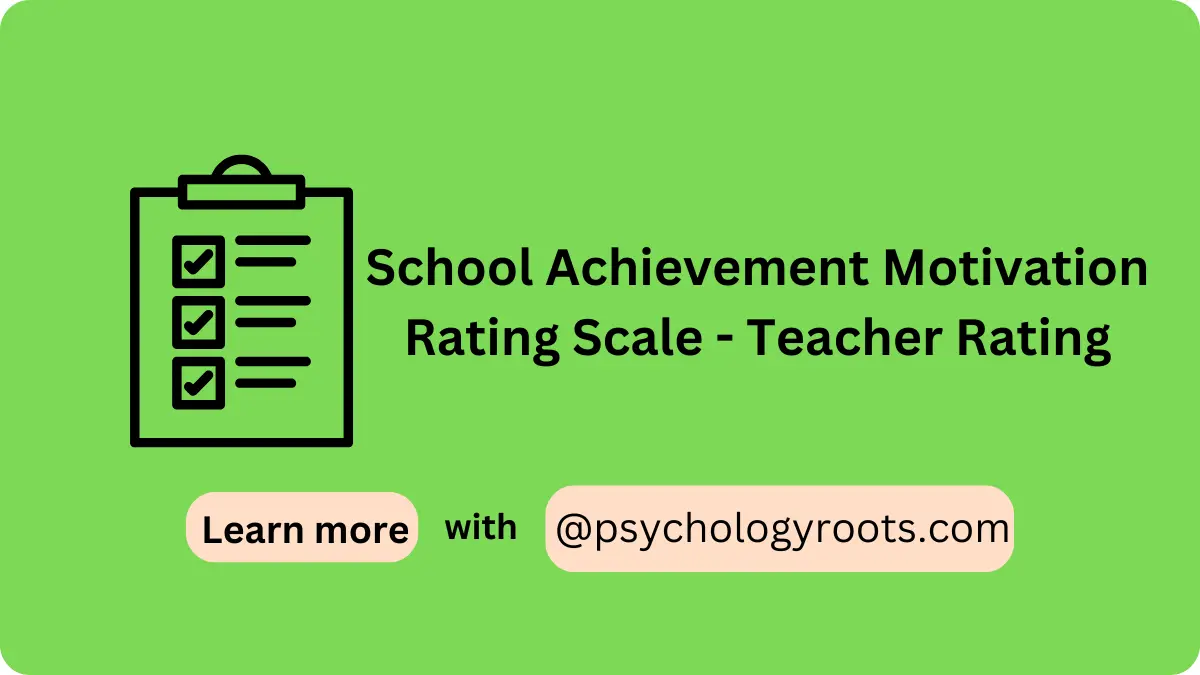Table of Contents
School Achievement Motivation Rating Scale – Teacher Rating
Here in this post, we are sharing the “School Achievement Motivation Rating Scale – Teacher Rating”. You can read psychometric and Author information. We have thousands of Scales and questionnaires in our collection (See Scales and Questionnaires). You can demand us any scale and questionnaires related to psychology through our community, and we will provide you with a short time. Keep visiting Psychology Roots.
About School Achievement Motivation Rating Scale – Teacher Rating
Scale Name
School Achievement Motivation Rating Scale – Teacher Rating
Author Details
Chiu
Translation Availability
English

Background/Description
The School Achievement Motivation Rating Scale is a teacher-administered instrument designed to evaluate the achievement motivation exhibited by students within a classroom setting. This scale reflects the student’s drive to succeed academically, which includes their willingness to perform well on assignments, overcome challenges, maintain high standards, and excel beyond their peers.
Developed by Chiu (1997), this tool is valuable for identifying students with varying levels of academic motivation, enabling targeted interventions to foster improved educational outcomes. Teachers can use it across diverse age groups, making it versatile for assessing students in Kindergarten through Grade 12.
Administration, Scoring and Interpretation
- Target Population: Students aged 5–18 years (Grades K–12).
- Instructions for Teachers:
- Rate each student on a 5-point Likert scale, evaluating how often they exhibit behaviors related to achievement motivation.
- Carefully read each item and consider the student’s typical behavior in the classroom.
- Ensure that responses are as objective as possible, based on observed behaviors rather than assumptions.
Reliability and Validity
- Reliability: The scale demonstrates an alpha score of .82, reflecting good internal consistency.
- Validity: The scale has been validated in classroom settings to ensure it accurately measures achievement motivation as observed by teachers.
Available Versions
15-Items
Reference
Chiu, L. H. (1997). Development and validation of the school achievement motivation rating scale. Educational and psychological measurement, 57(2), 292-305.
Important Link
Scale File:
Frequently Asked Questions
Q1: What is the purpose of the School Achievement Motivation Rating Scale?
The scale helps teachers assess the achievement motivation of their students, offering insights into their drive for academic success.
Q2: Who completes this scale?
This scale is completed by teachers based on their observations of students’ behaviors in the classroom.
Q3: How is the scale scored?
Teachers rate students on a 5-point Likert scale. Reverse coding is applied to specific items, and the scores are summed to determine the total motivation level.
Q4: What does a high score indicate?
A high score reflects a student’s strong desire to achieve academically, maintain high standards, and overcome challenges.
Q5: Is permission required to use this scale?
No, permission is not required for using this scale.
Disclaimer
Please note that Psychology Roots does not have the right to grant permission for the use of any psychological scales or assessments listed on its website. To use any scale or assessment, you must obtain permission directly from the author or translator of the tool. Psychology Roots provides information about various tools and their administration procedures, but it is your responsibility to obtain proper permissions before using any scale or assessment. If you need further information about an author’s contact details, please submit a query to the Psychology Roots team.
Help Us Improve This Article
Have you discovered an inaccuracy? We put out great effort to give accurate and scientifically trustworthy information to our readers. Please notify us if you discover any typographical or grammatical errors.
Make a comment. We acknowledge and appreciate your efforts.
Share With Us
If you have any scale or any material related to psychology kindly share it with us at psychologyroots@gmail.com. We help others on behalf of you.